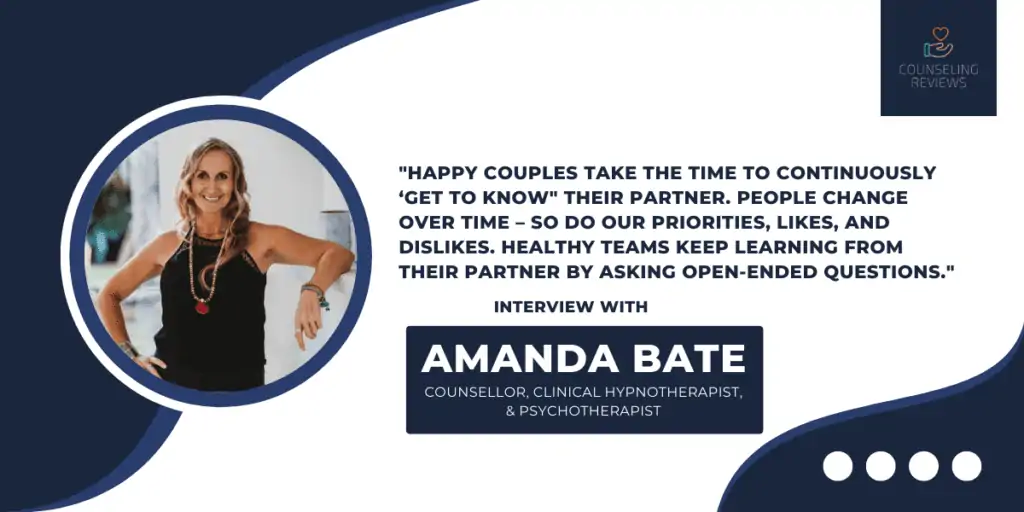Although turbulent marriages have always existed, most people do not seek marital therapy. Accessing marital therapy comes with a stigma, and many do not feel motivated to seek professional help to repair their relationships. An article published in the peer-reviewed journal Family Process highlighted the importance of increasing access to marital health care.
The article also states that roughly half of all Americans who marry for the first time end up applying for a divorce. Many of these marriages can be saved if they access help from marital therapists. Financial problems, lack of intimacy, and mistrust have all been linked to friction between couples. These frictions often culminate in unresolvable and irreconcilable differences between couples, leading to divorces.
We spoke with Amanda Bate, a marriage counselor, and coach, to understand what ails marriages today and how therapy can help fix some of the problems. Her passion is personal growth, professional development, and business success. As most of her clients tend to be couples, she realized that this is where most societal challenges are currently playing out.
Amanda has a strong background in diverse topics such as psychology, counseling, alternative therapies, spiritual development, fitness, health, and personal and business development. She’s lived all over Australia, before settling in Gold Coast.
What problems/challenges do married couples experience today?
Lately, there has been an increase in financial stress, communication issues, and anxiety/depression. These challenges could be due to the loss of jobs or downtime in jobs/businesses. Another issue has been exclusion and isolation. There is a big divide between friends and family members that have either been vaccinated or not. In some circumstances, I’ve seen couples reach out because the other person betrayed them and got vaccinated.
In addition, the isolation that stems from working from home while the other spouse can engage with individuals freely can result in stress within the relationship. The isolated person either experiences anxiety and fear of going out or has the opposite reaction – needing to go out and interact socially.
In what areas are these challenges evident?
Financially, we’ve noticed that a lot of people are not able to provide for their families. As a result, a ripple effect leads to anxiety, depression, and a lack of communication. This results in reduced intimacy and sexual activity.
As mentioned above, social and family networks are compromised due to whether individuals are vaccinated or not, creating separation and fear amongst those who would naturally be happy to engage with one another.
-
Before the pandemic, what were the most common challenges you faced with married couples?
-
What can you advise married couples with post-pandemic challenges?
- Revolving means repeating/looping in the same issues/challenges/problems like a revolving door in a hotel lobby and never resolving anything. Some couples remain in this paradigm their whole life and often become unhappy or numb.
- Evolving means that the relationship has transcended any drama hooks. One has become closer and made a conscious choice to grow, be honest, loyal, and remain committed to being in the relationship. This kind of couple, therefore, goes through things as a team.
- Dissolving means that the relationship has played out. Suppose the couple is open and has a level of emotional maturity. They break up by way of conscious uncoupling. No matter what one does, if neither of them is committed, they end up breaking up.
What is the best therapy married couples can get
The best therapy is any therapy that BOTH agree on. I’ve seen instances where one partner typically says they need therapy, and the other feels they are being dragged along by their hair. This is usually the biggest challenge for the therapist. I’d say therapy focuses on the root cause, not just the problem.
A therapy that encourages a more profound understanding of ‘self’ rather than focusing on another person’s fault is the best option. What I find most important is the connection and congruence with the therapist. Otherwise, therapeutic change is difficult.
Here are a few therapies that are evidence-based and are great for couples:
- Solution-focused therapy is excellent.
- The Gottman Method is also great, as it provides awareness of how we react in situations.
- Timeline therapy is excellent for exploring the root cause of the problem.
In my therapeutic practice, I have found that if one has never dealt with issues from a past relationship, relationship with parents, or childhood trauma, they repattern and repeat the situation till they gain insight. People desire to fall in love with someone and sustain that chemistry. However, I feel we need to shift our focus from this and seek to grow in love with someone to create alchemy. This really means that we are in a constant flow of how our worlds shift and evolve like nature itself.
Therapy can save your marriage
Indeed, more people are applying for divorce today. This could be the result of the pandemic or access to technology, greatly driving isolation among people. There is hope regardless of the reasons for an upsurge in divorces and separations. Speaking with marriage counselors and therapists can help save many marriages.
Several therapies, such as solution-focused therapy, the Gottman Method, and Timeline Therapy, can help improve relationships between couples. As Amanda Bate notes, issues from past relationships and experiences formed during childhood can creep into people’s married lives. These same patterns can play out until they are resolved during therapy sessions.
Every marriage is worth saving, and couples therapy can help individuals remain married, often blissfully. To learn more about how to save your marriage, contact Amanda Bate.




